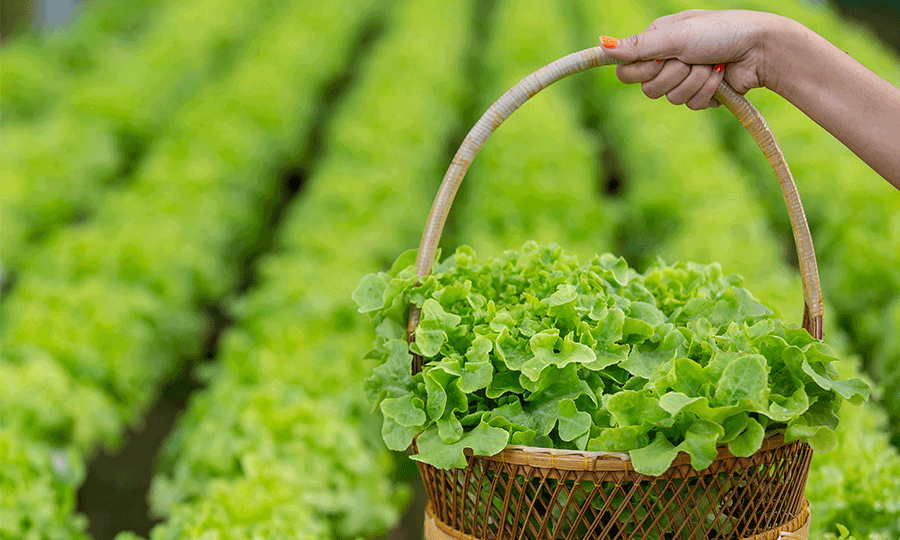Organic farming fertilizer

Organic farming fertilizers are naturally produced materials can be added to soil or plants to provide nutrients and sustain growth. One of the most used organic farming fertilizers that has been used for a long time is agricultural gypsum. It not only improves the quality of the crops and plants but also improves the soil structure.
Gypsum characteristics
Agricultural gypsum is a naturally occurring mineral that is high in both calcium and sulfur. which are essential nutrients for plants. Gypsum is found in both crystal and rock forms and is mined from open-pit or underground deposits. Gypsum can be a valuable source of both calcium and sulfur for plants. and can benefit certain soil properties under specific conditions. Gypsum is somewhat soluble in water and dissolves in water to release calcium ions (Ca+2) and sulfate-sulfur ions (SO4-2). The typical characteristics of agricultural gypsum include purity (CaSO4. 2H2O) of > 95%, calcium content of > 20%, and sulfur content of > 16%.
Gypsum can be applied to soil as a surface application and doesn’t have to be incorporated since it’s very soluble.
Benefits of agricultural gypsum, Organic farming fertilizer
Soil.
Agricultural gypsum has several benefits on soil, including these items.
Improves acid soils and treats aluminum toxicity. Gypsum can reduce aluminum toxicity, which often accompanies soil acidity, particularly in subsoils. Gypsum can improve some acid soils even beyond what lime can do for them. which makes it possible to have deeper rooting with resulting benefits to the crops.
Improves soil structure. Gypsum can improve soil structure, aeration, and drainage. resulting in increased water infiltration and reduced soil surface crusting and improved seedling emergence. It also helps break up compacted soil critical for increasing rooting depth, stabilizes organic matter. and decreases nitrogen loss to the atmosphere.
Reduces nutrient runoff and erosion. Adding gypsum to the soil reduces erosion by increasing the ability of soil to soak up water after precipitation. thus reducing runoff. Gypsum application also improves soil aeration and water percolation through the soil profile.
Remediate salinity and sodium issues. Gypsum can be used to remediate salinity and sodium issues and improve soil structure.
Reclaims sodic and high magnesium soils. Gypsum can improve soil structure, aeration, and drainage. resulting in increased water infiltration and reduced soil surface crusting and improved seedling emergence. It also helps break up compacted soil critical for increasing rooting depth. stabilizes organic matter, and decreases nitrogen loss to the atmosphere.
Plants.
Agricultural gypsum has several benefits on plants, including these items.
Source of calcium and sulfur for plant nutrition. Gypsum is an excellent source of sulfur for plant nutrition and improving crop yield. It also provides calcium in a way that is more available to plants than some other sources.
Improves root development. Gypsum can counteract the toxic effect of soluble aluminum on root development, which can stunt or kill plants. It can also promote better root development of crops, especially in acid soils, even without a big pH change.
Improves water-use efficiency. Gypsum increases water-use efficiency of crops. Improved water infiltration rates, improved hydraulic conductivity of soil, better water storage in the soil. They all lead to deeper rooting and better water-use efficiency.
Increases crop yield. Gypsum can improve plant fertility, provide needed sulfur and calcium nutrients, improve soil structure, improve plant root depth. It also improves seedling emergence, enhances biological activity, increases soil water retention. And improves soil tilth, reduces soil compaction, and reduces soil crusting.
Environment.
Agricultural gypsum has several benefits on environment, including these items.
Reduces air pollution. it reduces air polution by reusing gypsum from coal plants for agricultural purposes.
Recyclable material. Agricultural gypsum is also infinitely recyclable and maintains its natural properties during repeated application.
Settle dirt and clay particles. Agricultural gypsum can be used to settle dirt and clay particles in turbid water, particularly in ponds. without harming aquatic life.
Therefore agricultural gypsum is an organic farming fertilizer that is used to improve soil deficiencies and provide nutrients to plants. Unlike chemical fertilizers, it is free of harmful environmental effects.
